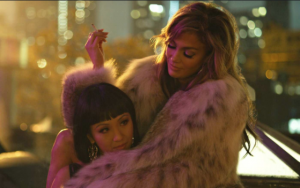HUSTLERS: 4 STARS: “a glitzy caper about money, friendship, and revenge.”
 If they gave out Oscars for pole dancing the release of “Hustlers” would place Jennifer Lopez one step closer to completing her EGOT collection.
If they gave out Oscars for pole dancing the release of “Hustlers” would place Jennifer Lopez one step closer to completing her EGOT collection.
“Jenny from the Block” plays Ramona Vega, centerfold turned superstar stripper. It’s the 2000s and the dancers at New York’s Sin City Café are lap-dancing all the way to the bank. “2007 was the best,” says Destiny (Constance Wu). “I made more money than a brain surgeon.” Ramona has taught Destiny the craft of separating the Wall Street bros who frequent their club from their money. She teaches the neophyte fancy pole moves like the “fairy sit” and “fireman spin,” and the nuances of customer service. “Get them a single, a double, then a triple and then a single,” she says. “You want them drunk enough to get their credit card but sober enough to sign the check.”
They follow the “green brick road” until September 29, 2008. Wall Street is gutted by a stock market crash, putting a stop to open-ended expense accounts and the dolla bills that showered the women as they danced. “It’s the end of an era in American business,” says Brian Williams on the news, and the end of way of life for Destiny, Ramona and friends.
Overnight everything changes. The business turns from glamourous to grimy. “The guys don’t want to spend the dollars,” says the dancer’s den mother (Mercedes Ruehl), “the girls don’t want to share tips in management took the cameras out of the champagne rooms.” With lap dances no longer enough to make money Ramona comes up with a new way of separating the Wall Street guys from their cash. “We can’t dance forever. We have to think like them. Nobody gets hurt.” A mix of sex appeal, flattery and knock-out drugs, it’s not exactly legal but they have no sympathy for the businessmen who they say robbed the country but didn’t get any jail time. “I know it sounds bad that we were drugging people,” Destiny says, “but in our world it was normal.” New recruits to their booming business bring trouble and soon it’s not the stock market crashing but police, crashing through their apartment doors.
Based on a true story and inspired by the New York Magazine article “The Hustlers at Scores” by Jessica Pressler, the movie’s narrative spine is an interview between a journalist (played by Julia Stiles subbing in for Pressler) and Destiny, giving the movie an as-told-told vibe.
The result is a fleet-footed dramedy that captures the heady, high-heeled days at the club when the money flowed like water and it was all giddy good times for the dancers. An early scene puts you in the mind of an R-rated snowglobe as J-Lo swings around a pole, dollar bills filling the air around her. Like the time it evokes, it’s over-the-top but easily upped by the next sequence which finds Ramona finding a quiet moment on a New York City rooftop. As the lights of the city twinkle behind her she is in repose, smoking a cigarette, a fluffy fur coat barely concealing her stage costume. Like some kind of Venus on the Half-Shell by way of 42nd Street she embodies the decadence of the time.
In the first part of the film the camp is amped. By the time Usher shows up, strutting into the club with the cool factor of Sinatra in his prime, a fistful of Benjamins in hand, the picture of the wild ‘n woolly era is complete. Director Lorene Scafaria then gear shifts, adding in the sense of desperation that comes when the money dries up. The movie shifts gears, becoming more of a caper flick as Ramona and pals go fishing for Wall Street sharks.
At the core of the story is the sisterhood between Ramona and Destiny. It’s a mother, mentor pairing that sees the two women bond on a level that transcends simply being business partners. “We are the untouchables,” says Ramona, “like Kobe and Shaq.” They become intricately involved in one another’s lives, which makes the sting of the coming events even more complicated. Lopez and Wu have spark together onscreen, bringing some heart to a story of people who trolled the dark side for a living.
“Hustlers” is a glitzy caper about money, friendship, and revenge against the bankers who went unpunished after a financial crisis brought the country and the dancers at the Sin City Café to their knees. “Everybody is hustling,” says Ramona. “This city, this whole country is a strip club. You’ve got people tossing the money and people dancing.”
